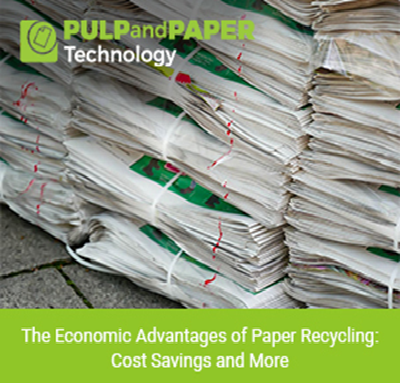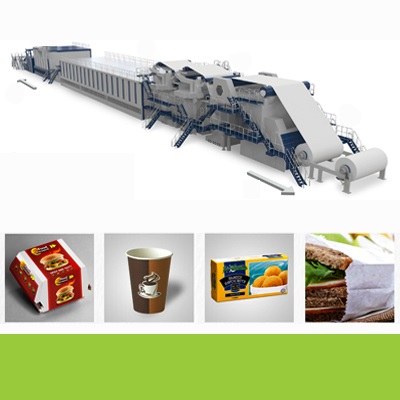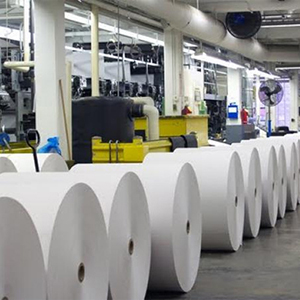The Economic Advantages of Paper Recycling: Cost Savings and More

Introduction:
In an era where environmental consciousness is a paramount concern, paper recycling emerges as a shining beacon of sustainability. It is a practice that not only offers substantial economic advantages but also plays a vital role in safeguarding our planet's delicate ecosystems. This article is a journey into the world of paper recycling, where we explore the significant benefits it brings to our economy.
Economic Benefits of Paper Recycling
1. Cost Savings: A Cornerstone of Paper Recycling
The economic benefits of paper recycling are prominently anchored in the concept of cost savings. In a world driven by fiscal prudence and sustainability, recycling paper emerges as a formidable ally for businesses, municipalities, and individuals alike.
Reducing Production Costs: Perhaps the most compelling economic rationale for paper recycling is its inherent ability to trim production costs. When compared to the conventional paper manufacturing process that relies on virgin pulp, recycling paper significantly reduces the financial burden. The reason lies in the efficiency of recycling. Rather than starting from scratch, recycling centers process recovered paper into new products, a process that demands less energy and fewer raw materials. Consequently, this results in a substantial reduction in the cost of paper production.
Economies of Scale: On a larger scale, the economics of paper recycling become even more compelling. Municipalities and businesses that invest in robust paper recycling programs stand to reap substantial financial rewards. By diverting paper waste from landfills and incinerators, these entities can reduce the associated disposal costs. In essence, recycling paper transforms what was once a financial burden into an opportunity for cost
savings.
Resource Efficiency: Paper recycling also capitalizes on resource efficiency. It takes fewer resources to collect and process recycled paper compared to the energy-intensive process of harvesting, pulping, and manufacturing virgin paper. This efficiency translates directly into monetary savings for those involved in the paper supply chain.
Revenue Generation: Beyond cost savings, paper recycling can become a source of revenue. Recycling centers can sell the recycled paper to paper mills and manufacturers, creating an additional stream of income. As recycling efforts expand and more paper is diverted from landfills, the potential for revenue generation increases, making recycling an increasingly attractive prospect for businesses and municipalities alike.
Boosting Competitiveness: Furthermore, embracing paper recycling initiatives can enhance a company's competitive advantage. In a time when eco-conscious consumers and stakeholders abound, enterprises that actively participate in recycling endeavors frequently garner a more positive public perception. This favorable image can result in heightened customer loyalty and a wider customer demographic, ultimately driving greater
profitability.
| Also Read: Next-Gen Paper Recycling Technologies: Advancements towards a Closed-Loop Circular Economy |
2. Job Creation: Empowering Communities through Paper Recycling
While the economic benefits of paper recycling are undeniable, one of its most impactful contributions is job creation. This aspect of recycling not only strengthens local economies but also fosters a sense of community engagement and empowerment.
A Growing Industry: Paper recycling is part of a dynamic industry that encompasses a wide range of activities, from the collection of paper waste to its processing and transformation into new products. Each of these stages requires a skilled and diverse workforce, making paper recycling a notable job generator.
Recycling Centers: At the forefront of the paper recycling process are recycling centers. These facilities rely on workers who manage the collection, sorting, and processing of paper materials. Jobs in recycling centers encompass a variety of roles, from equipment operators and material sorters to maintenance personnel and management positions.
Collection Services: Collecting paper waste from homes, businesses, and institutions is a crucial component of the recycling ecosystem. Many communities employ waste collection services dedicated to recycling. These services employ drivers, waste collectors, and administrative staff to ensure a smooth and efficient collection process.
Transportation and Logistics: The transportation of paper materials from collection points to recycling centers and then to paper mills requires a well-organized logistical network. This network relies on truck drivers, logistics coordinators, and dispatchers, creating further job opportunities within the transportation sector.
Processing Facilities: Recycling centers depend on specialized equipment and machinery to process recovered paper into high-quality recycled products. These facilities employ technicians, engineers, and maintenance crews to ensure the smooth operation of recycling equipment.
Local Economic Impact: The jobs generated by paper recycling are not limited to recycling centers and associated services. They extend to various support industries, such as maintenance and repair, equipment manufacturing, and even research and development of recycling technologies. The collective impact of these jobs on local economies can be substantial, promoting economic growth and stability.
Community Engagement: Beyond the economic benefits, paper recycling initiatives foster community engagement and a sense of environmental responsibility. When communities actively participate in recycling programs, it not only reduces waste but also promotes a collective commitment to sustainability.
Empowering Communities: Particularly in regions with high unemployment rates or economic challenges, paper recycling can empower communities by offering employment opportunities. It provides a means for individuals to support themselves and their families while contributing to a cleaner environment.
Sustainability Education: Paper recycling initiatives often go hand in hand with educational programs. These programs raise awareness about recycling practices, waste reduction, and environmental stewardship. They empower individuals with knowledge and skills that can be applied in the recycling industry and beyond.
3. Generating Revenue: Transforming Paper Recycling into a Profitable Venture Paper recycling goes beyond being an environmentally responsible action; it can also serve as a significant income stream for businesses, municipalities, and recycling centers. This article delves into how paper recycling converts discarded paper into a valuable asset, fortifying financial stability.
Selling Recycled Paper: At paper recycling's revenue-generation potential lies the ability to sell recycled paper. Recycling centers and collection services process recovered paper, turning it into a marketable commodity. This paper can then be sold to paper mills, manufacturers, and other businesses that use recycled paper as a raw material for various products.
Diverse Market Demand: The market for recycled paper is diverse and robust. Industries ranging from packaging and printing to tissue and cardboard manufacturing have a growing appetite for recycled paper products. This diverse demand ensures a steady market for recycled paper, creating opportunities for consistent revenue generation.
Profitable Partnerships: Collaborations with local businesses and industries can result in mutually beneficial arrangements. For instance, a recycling center might establish contracts with nearby manufacturers, guaranteeing a consistent supply of recycled paper while securing a steady source of revenue.
|
Also Read: Paper Recycling: A Sustainable Solution for B2B Businesses |
Price Stability: The price of recycled paper is often more stable than that of virgin paper. Virgin paper prices can fluctuate due to factors like pulp supply and demand, energy costs, and market volatility. Recycled paper, on the other hand, tends to have a more predictable pricing structure, offering a level of financial stability to businesses engaged in paper recycling.
Environmental Benefits and Economic Advantages: Beyond financial incentives, the adoption of recycled paper can also contribute to positive public relations and an improved corporate image. Companies that prioritize sustainability and incorporate recycled materials into their products often resonate with environmentally conscious consumers. This resonance can result in increased sales and a larger market share, further boosting revenue.
Government Incentives: Many governments provide financial incentives to promote recycling efforts. These incentives may come in the form of tax breaks, grants, or subsidies for recycling programs. Such support can significantly boost the financial viability of paper recycling initiatives, making them even more attractive for revenue generation.
Investment in Technology: Innovations in recycling technology have improved the efficiency of paper recycling processes. Investing in state-of-the-art equipment can enhance the quality of recycled paper products, making them more marketable and potentially commanding higher prices, thus increasing revenue potential.
Consumer Preference: As consumer consciousness of environmental concerns expands, the demand for eco-friendly products likewise increases. Companies that integrate recycled paper into their packaging and products can harness this consumer preference, potentially charging premium prices and enhancing their revenue.
4. Positive Corporate Image: How Paper Recycling Enhances Brand Reputation
In today's environmentally conscious landscape, a positive corporate image isn't just a competitive advantage; it's an essential component of business success. This article explores how embracing paper recycling can bolster a company's reputation, foster goodwill, and cultivate customer loyalty.
Environmental Responsibility: Demonstrating a commitment to paper recycling showcases a company's environmental responsibility. By actively participating in recycling programs, businesses signal that they care about the planet and are taking concrete steps to reduce their ecological footprint. This resonates with consumers who prioritize sustainability.
Consumer Perception: Consumer attitudes have evolved, with more people making purchasing decisions based on a company's sustainability practices. Businesses that engage in paper recycling and promote eco-friendly initiatives are perceived more favorably by consumers. This positive perception can translate into increased brand loyalty and market share.
Transparency and Trust: Transparent communication about a company's paper recycling efforts builds trust with customers. Sharing information about the percentage of recycled content in products, the reduction of waste, and the overall environmental impact creates a sense of openness and authenticity that consumers appreciate.
Sustainable Packaging: Packaging is a critical touchpoint for many businesses, and using recycled paper in packaging materials can significantly enhance a brand's image. Sustainable packaging not only reduces waste but also appeals to eco-conscious consumers who are more likely to choose products with environmentally friendly packaging.
Corporate Social Responsibility (CSR): Paper recycling aligns with corporate social responsibility initiatives, demonstrating a commitment to ethical business practices. Many consumers actively seek out companies that engage in CSR activities, including recycling and sustainable sourcing, and are willing to support such businesses.
Employee Engagement: A positive corporate image can also attract and retain talent. Employees often prefer working for companies with strong ethical values and sustainability programs. Engaging in paper recycling can boost employee morale and attract individuals who share the company's values.
Competitive Advantage: In competitive markets, a positive corporate image can set a business apart from its rivals. When consumers perceive a company as environmentally responsible, they may choose its products or services over those of competitors with less sustainable practices.
Long-Term Viability: Sustainability practices, including paper recycling, contribute to a company's long-term viability. By reducing waste, conserving resources, and minimizing environmental impact, businesses position themselves for future success in a world where sustainability is increasingly important.
Stakeholder Relations: A positive corporate image isn't limited to consumers. It extends to investors, partners, and regulatory bodies. Companies that prioritize sustainability are often better positioned to navigate regulatory changes, attract investment, and form strategic partnerships.
Media and Public Relations: Media outlets often feature companies with strong sustainability and recycling initiatives. Positive media coverage can further enhance a company's reputation and reach a wider audience, potentially increasing sales and market visibility.
Conclusion:
In conclusion, paper recycling is a win-win scenario for both the economy and the environment. It provides tangible economic benefits, such as cost savings, job creation, and revenue generation, while simultaneously contributing to environmental conservation by conserving resources, reducing greenhouse gas emissions, and mitigating deforestation. Embracing paper recycling is a step towards a more sustainable and prosperous future.









